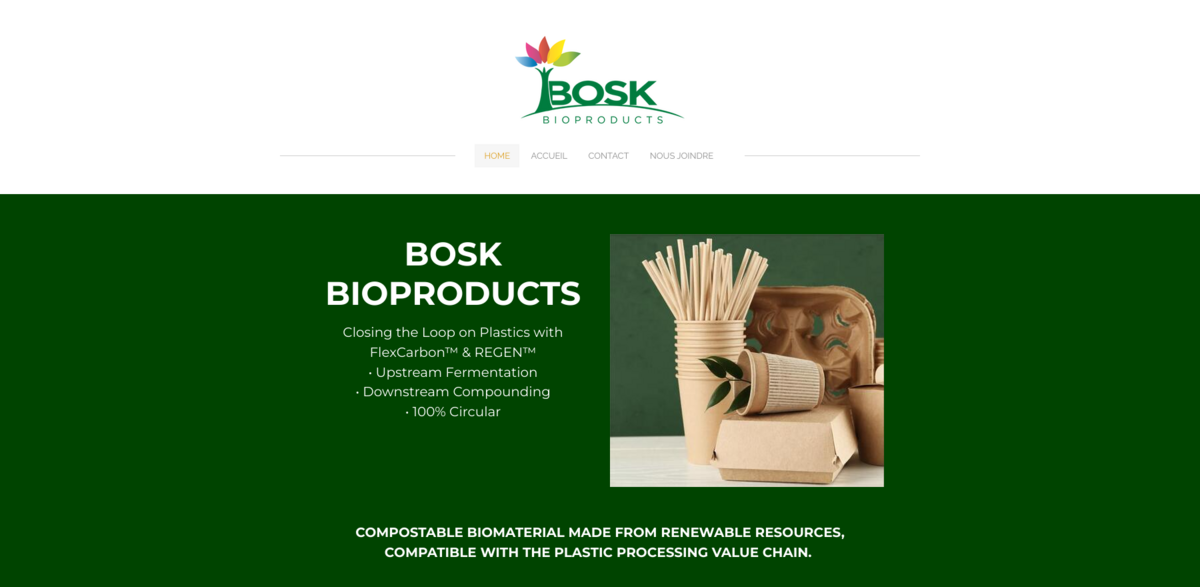What Is Bosk Bioproducts?
BOSK BIOPRODUCTS is revolutionizing the plastics industry by closing the loop on plastics with its innovative FlexCarbon™ and REGEN™ solutions. By utilizing upstream fermentation and downstream compounding processes, BOSK creates a plastic-like, 100% circular biomaterial made from renewable resources. This Canadian company specializes in compostable biomaterials that not only mimic the properties of traditional petrochemical plastics but are also biobased, compostable, food-contact approved, and cosmetic certified. It’s a fresh approach to tackle the global problem of plastic waste accumulation, offering a sustainable alternative that really makes a difference.
Main Benefit: Sustainable, High-Performance Innovation
- Biobased and compostable biomaterial made from renewable, untapped industrial byproducts
- Compatible with standard plastic manufacturing equipment and processes
- Certified for food contact and cosmetics, ensuring reliable safety and quality
- Regen™ technology reduces greenhouse gas emissions—each tonne of material can avoid up to 3 tonnes of GHG emissions
- Small carbon footprint: Life cycle analysis shows that using 1kg of REGEN™ can save up to 2kgs of GHG compared to fossil-based plastics
Innovative Technology and Materials
BOSK’s groundbreaking technology is at the heart of its unique offerings. The key to REGEN™ lies in an innovative method for producing Polyhydroxyalkanoates (PHA) via bacterial fermentation of “non-food grade” industrial byproducts. This process is quite remarkable—no GMOs and no enzymes are used, making it an ethical and eco-friendly alternative to conventional plastics. This production method not only helps to transform industrial untapped carbon sources but also produces a high-performance material that is both non-toxic and sustainable. It’s like turning waste into a valuable resource, pushing conventional boundaries while keeping performance levels high.
Sustainable Processes and Environmental Benefits
The ultimate advantage of BOSK’s approach over traditional plastics lies in its sustainable life cycle. Unlike conventional plastics that are difficult to recycle and often end up in landfills or the environment, REGEN™ is fully compostable. Once it has fulfilled its useful life, it naturally degrades into water, CO², and biomass—transforming into compost that benefits the environment. This effective composting process avoids the creation of persistent microplastics. The process is a gentle reminder that sustainability isn’t just an add-on feature; it is the core of a responsible, eco-friendly future. It’s really about ensuring that the product’s end-of-life is as thoughtful as its production.
Market Advantages and Product Performance
Companies looking to boost the value of their products without compromising on environmental stewardship will find BOSK’s REGEN™ extremely attractive. With excellent physical and mechanical properties comparable to those of traditional petroleum-based resins, REGEN™ ensures that performance is never sacrificed for sustainability. In fact, it offers a complete package: biobased, compostable, and designed using a revolutionary FlexCarbon™ technology that supports a circular economy. This offers manufacturers a clear market advantage—enhanced brand value and consumer trust come together with practical, modern manufacturing solutions. It’s an option that resonates well in today’s market, where environmental and performance criteria both count.
Circular Economy and Composting Future
Focusing on a truly circular approach, BOSK Bioproducts champions the benefits of composting as the only sustainable solution to manage end-of-life for plastics. Even recycled plastics have a limited useful life and may eventually be incinerated or discarded into the environment, contributing to waste and pollution. By contrast, fully compostable biomaterials like REGEN™ ensure that materials are transformed back into basic natural elements. This process not only eliminates the risk of harmful microplastics but also produces compost that nourishes the soil, thereby contributing to a zero waste future. It’s a forward-thinking model that underscores the potential of a closed-loop, circular economy.
Project Impact: Sustainable Development Goals
- SDG 9: Industry, Innovation and Infrastructure – Pioneering advanced manufacturing processes
- SDG 12: Responsible Consumption and Production – Promoting sustainable resource use
- SDG 13: Climate Action – Reducing greenhouse gas emissions through innovative production methods
- SDG 14: Life Below Water – Preventing plastic waste from entering marine ecosystems
- SDG 15: Life on Land – Minimizing land pollution and promoting soil health through composting
Market Opportunity and Future Perspective
The introduction of REGEN™ signals a major turning point in the pursuit of greener plastics. This innovative bioproduct opens up a sustainable market space where businesses can switch to alternatives that align perfectly with modern environmental standards without compromising on performance. By offering a product that is 100% biobased, compostable, and approved for food contact, BOSK Bioproducts provides an attractive option for firms aiming to reduce their carbon footprint and contribute to climate action. A shift toward this new plastic economy, where sustainability and functionality go hand in hand, is not just a trend—it’s a significant step toward a more responsible, circular future in manufacturing and consumption. Businesses that choose REGEN™ are not only investing in a high-performance material but are also taking part in a larger movement toward sustainable innovation and environmental stewardship…


















